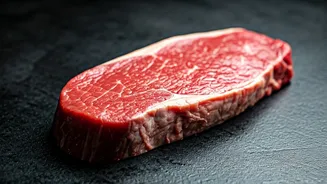Muscle Loss Noticed
One of the most apparent signs of protein deficiency is losing muscle mass. Protein is the fundamental building block for muscles. When your body doesn't
receive enough protein, it begins breaking down muscle tissue to get the amino acids it needs. This results in decreased muscle size and strength, making everyday activities, such as lifting objects, more challenging. Keep a keen eye on this if you're a man over 35, as age-related muscle loss (sarcopenia) can be exacerbated by insufficient protein. A healthy protein intake helps to maintain and build muscle mass, crucial for metabolism and overall physical function. Noticeable shrinking of muscles or a decrease in strength can indicate a need to adjust your diet.
Constant Fatigue Feelings
Feeling tired all the time? Protein deficiency can sap your energy levels. Protein plays a crucial role in transporting oxygen throughout the body. Without enough protein, your body's ability to create and use energy decreases, leading to persistent tiredness. If you find yourself struggling to stay awake or feeling exhausted even after getting enough sleep, it could be a warning sign. Proper protein intake is essential for various biological processes that produce energy, and maintaining sufficient protein levels can combat persistent fatigue and enhance overall vitality. Making sure you are getting enough protein is essential if you are experiencing this sign.
Frequent Mood Swings
Protein affects your brain's functionality, and it can impact your mood. Protein is essential for producing neurotransmitters, which are chemicals in the brain that regulate mood. When there isn't sufficient protein, the brain may struggle to produce these neurotransmitters, potentially causing mood swings, irritability, and even depression. These mental health changes can be subtle but are important to recognize, particularly in men over 35. Balanced protein intake supports stable mood regulation and can prevent or alleviate these mood-related symptoms.
Hair, Skin Problems
Your hair and skin can also provide clues about your protein intake. Protein is a key ingredient in hair and skin cell production and maintenance. A lack of protein can lead to brittle hair, hair loss, dry skin, and even skin rashes. Additionally, wounds might heal more slowly than usual, as protein is vital for tissue repair. So, if you notice significant changes in your skin and hair or have wounds that are taking a long time to heal, consider evaluating your protein intake to see if it needs an adjustment. Ensure your body has the raw materials it needs to be healthy.
Weakened Immunity Noticed
Protein is essential for a robust immune system. Protein molecules, such as antibodies, are responsible for fighting off infections and diseases. A protein deficiency can weaken your immune defenses, making you more susceptible to illnesses, infections, and even slower recovery times. Men over 35, who may be at an increased risk of age-related immune decline, should pay careful attention to their protein intake. Ensuring adequate protein consumption helps maintain a healthy immune response, decreasing the likelihood of falling ill and speeding up recovery.
Slow Wound Healing
Are cuts or scrapes taking longer to heal? Protein is vital in the repair of body tissues, especially when it comes to wound healing. When the body lacks sufficient protein, it struggles to repair damaged tissues and wounds may take longer to heal. This can make you more vulnerable to infections. If you notice wounds healing at a slower rate than usual, or if minor cuts and bruises seem to linger for an extended period, it's a good time to evaluate your protein intake. Maintaining good protein levels is essential for rapid wound healing and overall health.
Increased Hunger Levels
Protein has a significant effect on feelings of satiety. It takes longer to digest protein than carbohydrates, which makes you feel full for a longer time. If your diet is low in protein, you may experience increased hunger levels and frequent cravings. This could potentially lead to overeating and, consequently, weight gain. For men over 35, maintaining a healthy weight can be a significant health objective. Ensuring adequate protein consumption can help regulate your appetite, helping to avoid overeating and aiding in weight management. Pay close attention to your body's hunger cues and make adjustments as needed.



















